South Korea: Lingzhi reduces the high-fat diet-induced obesity by regulating carbohydrate and lipid metabolism
- Categories:Media Center
- Time of issue:2021-07-02 10:36
- Views:
South Korea: Lingzhi reduces the high-fat diet-induced obesity by regulating carbohydrate and lipid metabolism
- Categories:Media Center
- Time of issue:2021-07-02 10:36
- Views:
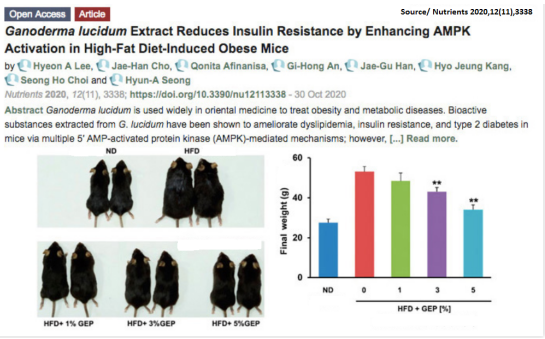
If obesity cannot be suppressed, is there any way to slow down weight gain without suppressing appetite, or even gain weight more healthily? A research report published by a South Korean team in Nutrients showed that Ganoderma lucidum can activate AMPK, a key enzyme in cell energy metabolism, to reduce fat accumulation, improve glucose use and reduce the risk of obesity, fatty liver, hyperglycemia and hyperlipidemia induced by a high-fat diet (HFD).
Researchers from Chungbuk National University, Kyungpook National University and National Institute of Horticultural and Herbal Science of South Korea jointly published their findings in the November 2020 issue of "Nutrients" (Nutrients Journal) :
For mice that eat high-fat feed, if Ganoderma lucidum extract powder (GEP) is added to their feed, after 12 weeks of experimentation, the mice have no obvious problems with weight, body fat, insulin resistance, blood sugar or blood lipids. Moreover, the more Ganoderma lucidum extract is added, the closer these indicators of mice that eat high-fat feed will be to those of mice with a normal chow diet (ND) and balanced nutrition, which can even be seen from the appearance.

Eat the same amount of feed but become less fat
It can be seen from Figure 1 that after a twelve-week experiment, the size and weight of mice on a high-fat diet were almost double that of mice on a normal chow diet, but the mice that were also fed with Ganoderma lucidum extract had different changes ─ The addition of 1% Ganoderma lucidum extract is still not obvious, but the addition of 3% is very obvious, especially the inhibitory effect of adding 5% to the portly is more significant.

The Ganoderma lucidum extract that these mice ate was obtained by extracting dried fruiting bodies of artificially cultivated specific Ganoderma lucidum strains (ASI7071) with 95% ethanol (alcohol) by the Mushroom Research Department of the National Institute of Horticultural and Herbal Science of South Korea. The major bioactive constituents of the Ganoderma lucidum extract are stated in Table 1: Ganoderic acids account for 53%, and polysaccharides account for 27%. The dietary compositions used in this study are stated in Table 2.
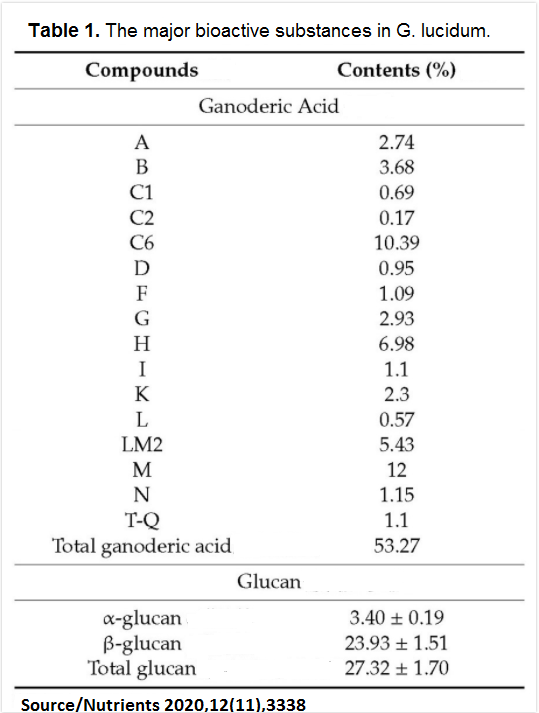
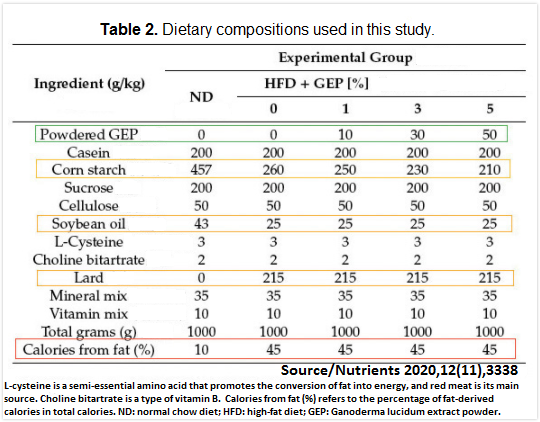
As Ganoderic acid has a bitter taste, one cannot help but wonder whether it affects the food intake of the mice and causes weight loss. No! The results show that both groups of mice ate almost the same amount of feed every day (Figure 2 right), but there are significant differences in the weight gain of the mice before and after the experiment (Figure 2 left). This seems to imply that the reason why Ganoderma lucidum extract can compete with a high-fat diet may be related to the enhancement of metabolic efficiency.
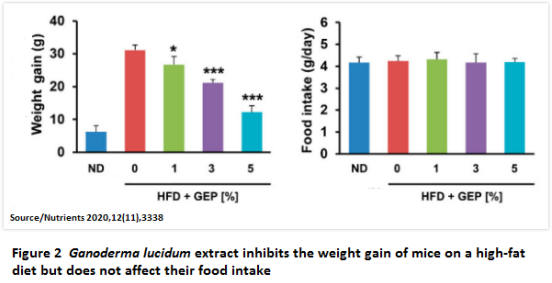
Ganoderma lucidum inhibits fat accumulation and adipocyte hypertrophy
Weight gain is usually related to the "growth of muscle or fat". It’s okay to grow muscles. The problem lies in growing fat, that is, white adipose tissue (WAT), which is responsible for storing excess calories in the body, has increased. These extra fats may accumulate in different parts. Compared with subcutaneous fat, visceral fat (also called abdominal fat) accumulated between various organs in the abdominal cavity and ectopic fat appearing in nonadipose tissues (such as liver, heart and muscle) are often more closely related to obesity-related risks such as diabetes, fatty liver and cardiovascular disease.
According to the results of the above animal experiments, Ganoderma lucidum extract can not only reduce the accumulation of subcutaneous fat, epididymal fat (representing visceral fat) and mesenteric fat (representing abdominal fat) (Figure 3) but also reduce the fat content in the liver (Figure 4); It is more intuitive to see from the section of adipose tissues of the epididymis that the size of the adipocytes will change due to the intervention of Ganoderma lucidum extract (Figure 5).
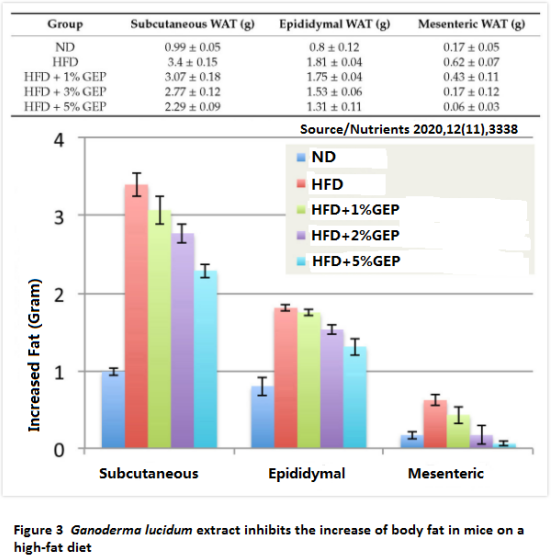
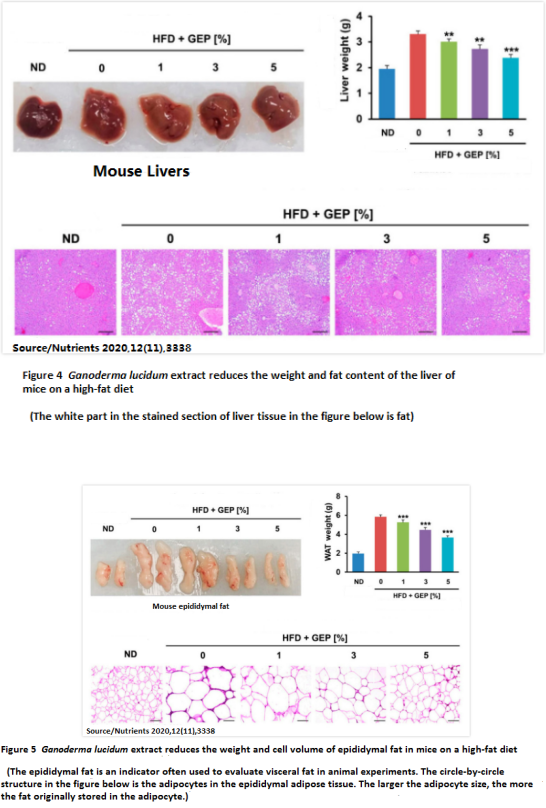
Ganoderma lucidum alleviates hyperlipidemia, hyperglycemia and insulin resistance
Adipose tissue is not only a storehouse for the body to accumulate excess fat but also secretes various "fat hormones" that affect carbohydrate and lipid metabolism. When the body fat content is higher, the interaction of these fat hormones will reduce the sensitivity of tissue cells to insulin (this is the so-called "insulin resistance"), making it more difficult for the cells to use glucose.
The result will not only increase blood sugar but also cause abnormal lipid metabolism, causing problems such as hyperlipidemia, fatty liver and atherosclerosis. At the same time, the pancreas will be forced to secrete more insulin. Because insulin itself has the effect of promoting fat accumulation and inflammation, the over-secreted insulin not only does not solve the problem but also makes obesity and all the above problems worse.
Fortunately, according to this South Korean research report, Ganoderma lucidum extract has a corrective effect on the abnormal secretion of fat hormones (leptin and adiponectin), increased insulin resistance and decreased glucose utilization caused by high-fat diet. The specific effect is shown in the above-mentioned animal experiments: For mice on a high-fat diet supplemented with Ganoderma lucidum extract, their dyslipidemia and elevated blood sugar and insulin were relatively mild (Table 3 and Figure 6).
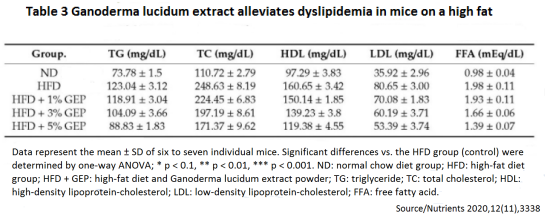
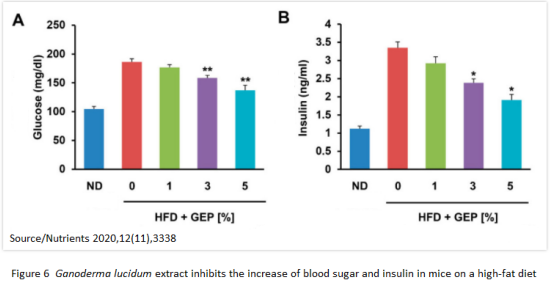
Ganoderma lucidum activates the key enzyme of cell energy metabolism - AMPK
Why can Ganoderma lucidum extract turn the crisis of a high-fat diet into a turning point? The researchers took out the adipose tissue and liver tissue of the above-mentioned experimental mice for analysis to see how these cells would be different due to the supplement of Ganoderma lucidum extract under the same high-fat diet.
It was found that the Ganoderma lucidum extract promoted the activity of the enzyme AMPK (5' adenosine monophosphate activated protein kinase), which is responsible for regulating energy in adipocytes and liver cells. The activated AMPK can inhibit the expression of genes related to adipogenesis and increase the insulin receptor and glucose transporter (protein that transports glucose from the outside of the cell to the inside of the cell) on the cell surface.
In other words, Ganoderma lucidum extract fights high-fat diet through the above-mentioned mechanism, thereby reducing fat accumulation, enhancing glucose utilization, and ultimately achieving the goal of reducing weight gain.
In fact, it is very meaningful that Ganoderma lucidum extract can regulate AMPK activity because reduced AMPK activity is associated with obesity or type 2 diabetes induced by a high-fat diet. The commonly used hypoglycemic drug metformin in clinical practice is partly related to increasing the AMPK activity of adipocytes and liver cells. At present, increasing AMPK activity is also considered as a feasible strategy to enhance metabolic rate in the development of many new drugs to improve obesity.
So the research on Ganoderma lucidum really keeps up with the progress of science and the pace of the times, and the above-mentioned delicate research from South Korea provides the simplest solution for you and me who "want to eat well but don’t want to be affected by eating well", that is, to replenish Ganoderma lucidum extract which contains various ganoderic acids and Ganoderma lucidum polysaccharides.
[Data Source] Hyeon A Lee, et al. Ganoderma lucidum Extract Reduces Insulin Resistance by Enhancing AMPK Activation in High-Fat Diet-Induced Obese Mice. Nutrients. 2020 Oct 30;12(11):3338.
END

★ This article is published under the exclusive authorization of the author.
★ The above works cannot be reproduced, excerpted or used in other ways without the authorization of the author.
★ For any violation of the above statement, the author will pursue the related legal responsibilities.
★ The original text of this article was written in Chinese by Wu Tingyao and translated into English by Alfred Liu. If there is any discrepancy between the translation (English) and the original (Chinese), the original Chinese shall prevail. If readers have any questions, please contact the original author, Ms. Wu Tingyao.


Search
GanoHerb Group
Headquarters Address: Building 9, Phase 1, Innovation Park, Haixi Park, Fuzhou High-tech Zone, Fuzhou City, Fujian Province, China
Healthline:400-8899-773 Hotline:18105908051
COPYRIGHT © GanoHerb Group 闽ICP备05002116号-10 Powered by:300.cn

官方公众号

Wechat Mall

Tmall

Jingdong Mall


